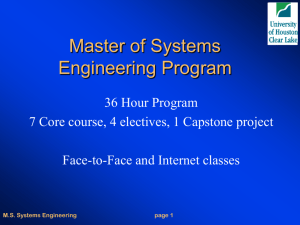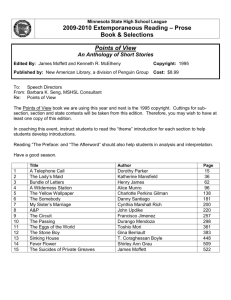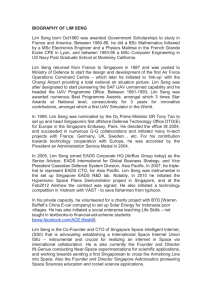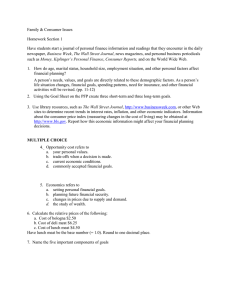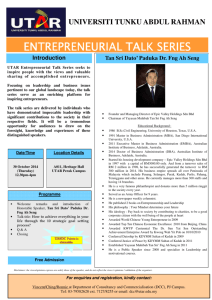Des Moines Register 06-18-06 Iowa-born leader opens global doors
advertisement
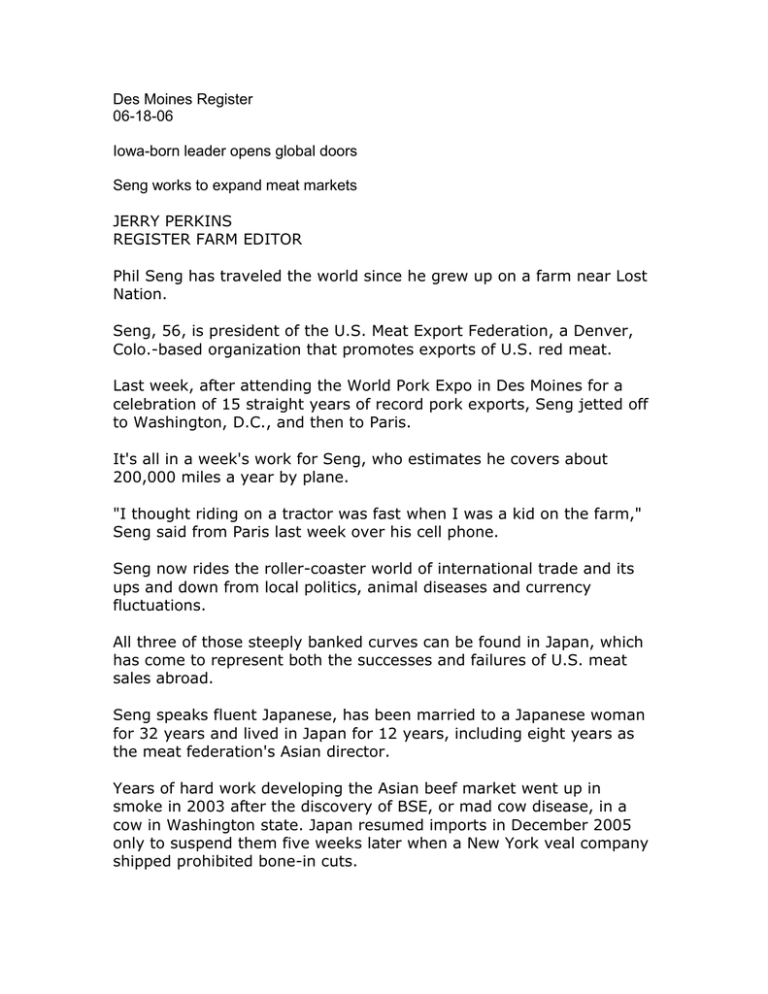
Des Moines Register 06-18-06 Iowa-born leader opens global doors Seng works to expand meat markets JERRY PERKINS REGISTER FARM EDITOR Phil Seng has traveled the world since he grew up on a farm near Lost Nation. Seng, 56, is president of the U.S. Meat Export Federation, a Denver, Colo.-based organization that promotes exports of U.S. red meat. Last week, after attending the World Pork Expo in Des Moines for a celebration of 15 straight years of record pork exports, Seng jetted off to Washington, D.C., and then to Paris. It's all in a week's work for Seng, who estimates he covers about 200,000 miles a year by plane. "I thought riding on a tractor was fast when I was a kid on the farm," Seng said from Paris last week over his cell phone. Seng now rides the roller-coaster world of international trade and its ups and down from local politics, animal diseases and currency fluctuations. All three of those steeply banked curves can be found in Japan, which has come to represent both the successes and failures of U.S. meat sales abroad. Seng speaks fluent Japanese, has been married to a Japanese woman for 32 years and lived in Japan for 12 years, including eight years as the meat federation's Asian director. Years of hard work developing the Asian beef market went up in smoke in 2003 after the discovery of BSE, or mad cow disease, in a cow in Washington state. Japan resumed imports in December 2005 only to suspend them five weeks later when a New York veal company shipped prohibited bone-in cuts. The ban has caused the loss of billions of dollars for the beef industry. "That's a trauma no industry should have to go through," Seng said. "It's a tough issue to defuse once it has become politicized as it has in Japan, where it's a celebrated issue." Alan Albright, a cattle producer from Lytton, said Seng is the right man to have at the helm during these trying times. "He's a rural Iowa boy who's made it big on the international trade scene," said Albright, who was a Meat Export Federation director for 13 years. "Although people don't know much about Phil here, he's very well-known around the world." Reopening the Japanese market has proven to be extremely difficult, Albright said. "We're at the end of our rope," he said. "We might need to rally the cowboys." Although Japan has closed its doors to U.S. beef, it's opened a window for U.S. pork. U.S. pork exports to Japan are down during the first three months of this year, but Japan purchased almost 40 percent of the record 2.66 billion pounds of U.S. pork sold overseas in 2005. "Pork sales in Japan have done well because of the double whammy" of the beef ban and fears of avian influenza, which has hurt poultry sales, Seng said. Because of Japan's importance to U.S. meat exporters, Seng's background as director of the federation's Asian office from 1982 to 1990 has paid off. After growing up on his family's farm, Seng studied political science at St. Ambrose University in Davenport, where he met his wife, Sumie, a foreign exchange student from Japan. Seng earned a master's degree in East Asian studies with a specialty in Japan at the University of Arizona. He taught English at a Japanese women's college, took a job with the Japanese Foreign Ministry and was the morning TV anchor for an English language newscast in Tokyo. Seng remembers reading on the air the announcement of the first trade agreement that opened the Japanese market to U.S. beef. "I had no idea what that would lead to," Seng said. "Back then, it was easier to buy whale meat than beef in Japan. The only beef in Japan came from Australia." Seng returned to the United States in 1978, where he worked for a Japanese company. "At that time, people had no concept how the Japanese market worked," Seng said. "Working for a Japanese company gave me a tremendous insight into the market there." When the U.S. Meat Export Federation wanted an Asian director in 1982, Seng was ready to go back to Japan to promote U.S. meat sales. At the Meat Export Federation, Seng was able to combine his background in farming with his interest in international markets. "Coming from the farm, I was always interested in agriculture," he said. In 1982, when Seng joined the meat federation, there were more exports of live hogs to Asia then there were sales of U.S. pork. "Farmers there wanted our genetics," Seng said, not U.S. meat. In Japan and Korea, politically powerful farm organizations resisted imports. "Farmers there saw our meat as a direct threat," Seng said. "But we felt their protein consumption was low and we could expand our sales there without hurting their domestic livestock producers." U.S. meat sales in Asia grew slowly, year by year, with many of the first sales going to hotels that catered to Western tourists. Then, Seng said, the Asian economic boom led to a classic case of foreign market development: As incomes rose, consumers used their increased purchasing power to improve their diets. That meant buying more protein, especially meat. U.S. meatpackers aggressively pursued foreign markets, Seng said, and meat shelf life research at Iowa State University and Texas A&M helped get beef and pork safely into supermarkets in Asia. "Steady advances in the quality of U.S. meat was the catalyst that got pork to take off," Seng said. Soon after Seng took over as the Meat Export Federation president, it opened an office in Mexico City. The office also works on developing markets in Cuba and the Dominican Republic, said Gilberto Lozano, the federation office director. Mexico is the second-largest buyer of U.S. pork behind Japan in terms of the value of pork purchased, but is No. 1 in terms of tonnage. Imports of U.S. pork to Mexico grew 32 percent in volume and 22 percent in value to $141.4 million during the first three months of this year. Lozano said the Mexican market for U.S. pork has grown an average of 5 percent a year. As in Japan, Mexican hog producers are unhappy about U.S. pork imports. And, like Japan, the U.S. Meat Export Federation's strategy is to complement, not compete with, domestic producers. "We are trying to gain a position without hurting the Mexican producers," Lozano said. "There's more demand for pork in Mexico than their domestic pork producers can supply." Lozano said Seng's experience in Asia has given him a long-term vision. "He's a great leader who gives you direction, but he doesn't impose on you. He guides you." Dennis Erpelding grew up on a farm near Whittemore and can appreciate the distance that Seng has traveled since leaving Lost Nation. Erpelding, who is manager of Elanco Animal Health's government relations, public affairs and communications, takes over as chairman of the U.S. Meat Export Federation in November. "Phil's got that Iowa farm boy philosophy - he understands agriculture, he has a hard work ethic and his international experience gives him an understanding for world markets," Erpelding said. Erpelding said Seng has a strong presence and standing in the international meat trade. "It doesn't matter if they're from Asia, Europe or South America," Erpelding said. "They all know Phil and have a high regard for him." Seng took a typically long-range view when he was asked by a hog producer at the World Pork Expo about the future of U.S. pork sales to China. "The Chinese market has been tempting since the 18th century," Seng said. "The Chinese economy has been one of the fastest growing in the past 10 years and it's a voracious market for pork with large urban populations. But I caution people not to think that China will be the next Japan. That's 15 years away."
